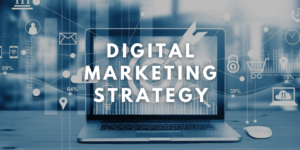What is Digital Marketing Strategy?

A digital marketing strategy utilizes selected marketing channels, including paid media such as Google ads, earned media, and owned media. Without a well-defined plan, executing a this strategy is akin to navigating a new city without GPS, leading to mistakes and delays. Moreover, this blog explores effective digital marketing strategies, providing inspiration for your own approach. We will examine key components of various approaches, such as content marketing and social media advertising, illustrating how you can leverage them for your business.
Understanding the Essence of Digital Marketing Strategy
A digital marketing strategy is a plan for how you’ll use your business’s digital marketing channels to achieve certain goals. However, it might also include goals for any digital platforms, websites, content assets, or sponsored advertisements that you have access to, as well as goals for both paid and unpaid media. Furthermore, your digital marketing strategy should be distinctive to your company and your goals.
Frameworks of an Effective Digital Marketing Strategy
Building an effective digital marketing strategy starts with a strong foundation. From target audience analysis to data analysis, every step in the digital marketing process shapes success. Furthermore, discover the frameworks that work for successful online campaigns. Find out how to match target audience analysis, good content creation, and effective campaign optimization for a strong digital marketing strategy.
Understanding Your Audience
Understanding your target market’s requirements and goals can help you to personalize your marketing strategies and connect with them. Moreover, making use of analytics, surveys, feedback, and team engagement, generating buyer personas becomes a potent instrument for successful marketing.
- Analytics from the websites, email marketing software, and social media accounts you currently have
- Forms for surveys and feedback
- Speaking with your customer service and sales teams
- Create buyer personas to focus marketing efforts on customers’ difficulties and goals.
Establish Your Goals
A more precise and compelling aim should be tied to your whole digital marketing strategy rather than general objectives like “promote your business” or “increase your audience.”
Setting SMART goals is like creating a roadmap for your marketing success. Moreover, when you set SMART goals (specific, measurable, attainable, relevant, and time-bound), you make sure you have a track record of progress, realistic goals, consistency with your overall marketing plan, and a time frame for achieving them. SMART goals are like a GPS to your marketing efforts. They point you in the right direction for effective results and help you stay on track.
Review Your Previous Efforts
Although formulating a plan is difficult work, it typically doesn’t involve starting from scratch. Perform an audit of your prior efforts to determine what has and hasn’t been performed successfully. In order to avoid continually inventing the wheel, now is a good time to gather content and other materials that may be reused. For example, a quote from a previous blog post can be an excellent quote for your Instagram account.
Determine Your Nuts and Bolts
Even while your creative side is flowing, you still have a lot of practical logistics to think about. The act of planning involves more than just daydreaming; it also entails determining what is possible given the limitations. Moreover, before planning your strategy, keep the below-written points in mind.
Budget: What budget do you have for digital marketing?
People: Who will be in charge? Will you have to delegate any responsibilities or tasks?
Channels: Which marketing platforms will you employ, and what objectives will be associated with each platform?
Plan Everything Out
The procedures required to develop a digital marketing campaign management template are the information in this book that are most crucial. It entails making an easy calendar that unites all various components by mapping a single email campaign on the calendar and then adding other components from there. Any process needs trial and error; therefore, it’s crucial to be willing to undertake both in order to determine the optimal course of action.
Why there is a need for the Strategies?
You can lose money, waste time, and accomplish nothing by promoting your business online if you don’t have an internet marketing strategy for your brand or if you choose the incorrect online marketing technique.
Today’s opportunities and challenges provide a number of challenges that necessitate the use of diverse internet marketing strategies and solutions. Digital marketing strategies that have worked well for one target audience may not be the best ones for another. Similar to this, internet marketing strategies that were successful a year ago could not be effective now.
With a specific digital marketing strategy, you can
- Recognize marketing gaps
- Better and more rapid income creation
- Expand your reach and better target your audience
- Increase leads, sales, and interest.
- Conserve your time, money, and resources.
5 Best Strategies for Digital Marketing
1. SEO (Search Engine Optimization)
SEO is the process of raising a website’s SERP position for desired keywords or related queries. By using SEO, you may increase the visibility of your website on search engines, which will help you draw attention and draw in new and returning clients. Using SEO methods can help various organizations, from eCommerce to personal injury law firms. Of course, SEO for e-commerce sites would call for a different approach than that for websites for legal firms.
Different types of SEO:
On-page SEO: is carried out specifically for users and search engines on websites.
Off-Page: Although link building for websites is part of off-page SEO, it is not done directly on websites.
Technical SEO: Crawling, indexing, rendering, and website architecture are all parts of technical SEO.
2. Content Marketing
A marketing strategy known as content marketing focuses on producing and disseminating educational, entertaining, and inspirational information to gain the trust of consumers and raise brand recognition
There are three distinct phases:
Awareness Phase : At this time, a potential consumer is either seeking knowledge or a solution to a specific issue.
Consideration Phase : During this time, the prospective client is more interested in knowing more about your good or service to address their issue.
Purchase Phase: It is the final stage in which the user searches for instructions on how to buy anything.
3. Social Media Marketing (SMM)
Social media marketing is the practice of promoting a business’s goods and services using social media networks or platforms. Achieve the required marketing and branding objectives, it involves developing content that is specifically designed for each social media site.
Furthermore, this kind of digital marketing strategy frequently includes uploading articles, photographs, videos, or other types of material that interest the audience, as well as paying for social media advertisements. Use social media management tools to post and schedule content across various social media channels. Below are some popular social media channels:
4. Search Engine Marketing (SEM)
SEM is also a lucrative digital marketing strategy. The goal of SEM is to position your company or website at the top of search results, much like SEO, but using sponsored ads like Pay Per Click, or PPC. In order for users to see a brand’s advertisement when they search for certain phrases, advertisers place bids on such keywords. Additionally, to increase online traffic, many people employ corporate search marketing. Moreover, when a user clicks on the advertisement, the brand is charged.
5. Email Marketing
Email marketing is the practice of distributing promotional emails to your target market to boost sales of your goods or services. regardless of whether you want to increase sales or brand recognition, it is still one of the most affordable ways to market your company. Moreover, by observing these email marketing trends in 2023, effective email campaigns will become a reality.
Wrapping Up
In today’s ever-evolving digital landscape, a well-thought-out digital marketing strategy is the cornerstone of any successful business. It enables you to reach and engage your audience, generate traffic to your site, and ultimately boost your sales and brand awareness.
Without a solid strategy, you’re at risk of wasting your time, money, and energy on marketing stunts that don’t add up to much.
At Digital Notebook, we understand the importance of a robust digital marketing strategy and are here to help you navigate the complex digital landscape. Our team of experts specializes in creating tailored strategies that align with your specific goals and objectives. We combine data-driven insights, innovative techniques, and the latest marketing tools to deliver exceptional results. Contact us today and unlock the full potential of digital marketing services!






